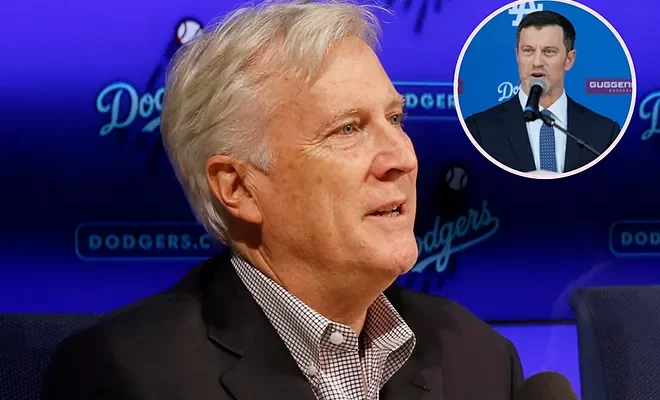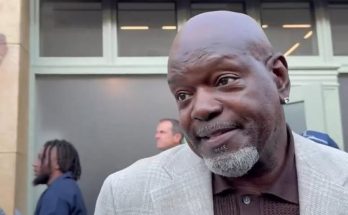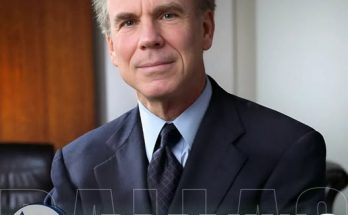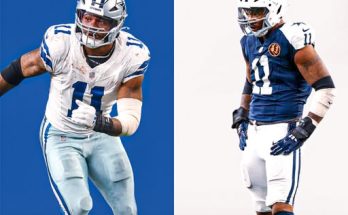The Los Angeles Lakers have long been one of the most storied franchises in professional sports, a team whose name is synonymous with championships, star power, and the relentless pursuit of excellence. But as much as the Lakers’ on-court history is defined by the likes of Magic Johnson, Kareem Abdul-Jabbar, Kobe Bryant, and LeBron James, their off-court story is often just as compelling—centered around ownership, vision, and the infrastructure needed to keep the franchise among the elite. Now, with Mark Walter stepping into his role as the team’s new owner, the Lakers are entering a fresh era—one that, according to Los Angeles Dodgers President Stan Kasten, will be driven by an owner whose hunger for winning borders on obsessive. Kasten, who has worked alongside Walter for years within the Dodgers organization, did not mince words when describing the man now tasked with guiding the Lakers into the next chapter. “He wants to win so badly,” Kasten said, underscoring that Walter’s competitive drive is not just about maintaining the Lakers’ legacy—it’s about building on it.
Mark Walter is not a name that most casual basketball fans would have instantly recognized before this transition, but in the world of high-stakes sports ownership, he’s already well established. As the CEO of Guggenheim Partners, Walter was instrumental in the 2012 acquisition of the Dodgers, a move that revitalized the franchise after years of uncertainty. His tenure has been marked by significant investment in talent, infrastructure, and analytics, helping transform the Dodgers into a perennial powerhouse in Major League Baseball. That same philosophy—deep pockets combined with a strategic, long-term vision—is now poised to shape the Lakers’ future. Kasten’s remarks about Walter’s will to win are not just platitudes; they are grounded in over a decade of watching him pour resources, attention, and energy into building a winning culture in baseball. For Lakers fans, this endorsement carries weight, particularly because the Dodgers have become one of the most consistently successful organizations in all of sports under Walter’s watch.
The timing of Walter’s arrival in the Lakers’ front office is especially significant. The franchise stands at a crossroads: LeBron James, the face of the team since 2018, is nearing the twilight of his career, and the Lakers must prepare for a transition that ensures they remain competitive in the post-LeBron era. Walter’s history suggests he thrives in such high-pressure moments. When he took control of the Dodgers, the team was emerging from a period of instability, and in less than three seasons, they became a perennial contender. Applying that same model to the Lakers will require navigating the unique challenges of the NBA—salary caps, superstar egos, free agency dynamics, and the need for long-term roster construction in a league that often swings on just a handful of elite players.
One of the most important takeaways from Kasten’s comments is the emphasis on Walter’s personal investment in success. In the modern sports landscape, ownership can vary dramatically in approach—some owners are content with steady profitability, while others view their teams as passion projects worth any cost to win. Walter, by Kasten’s account, falls squarely in the second category. This bodes well for Lakers fans who have occasionally criticized ownership for being hesitant to make bold, win-now moves. If Walter applies the same aggressiveness he showed in baseball—whether in blockbuster trades, free-agent signings, or organizational overhauls—the Lakers could be on the verge of a major competitive resurgence.
There’s also an intangible element to Walter’s arrival that could prove vital: his reputation for fostering stability and professionalism within an organization. The Lakers have, at times, been criticized for internal politics, front-office instability, and a reliance on star-driven quick fixes that can backfire in the long run. Walter’s track record with the Dodgers shows a preference for building a solid foundation first, then layering on star talent. This could mean investing in scouting and player development to a degree the Lakers haven’t fully committed to in recent years. While NBA player development differs from baseball in scope and timeline, the principle remains—creating a culture where both stars and role players thrive is essential for sustained success.
Financially, Walter’s presence offers another clear advantage. The Lakers already generate massive revenue thanks to their global brand, but having an owner with both the resources and willingness to push spending limits could be transformative. In MLB, Walter authorized the Dodgers to take on massive payrolls and luxury tax penalties when necessary to remain competitive. In the NBA, while the salary cap and luxury tax system are more restrictive, a committed owner can still leverage financial flexibility to absorb costly contracts, facilitate trades, and maintain roster depth without cutting corners. That mindset could make the difference in a crowded Western Conference where a single high-impact move can shift the balance of power.
Walter’s competitive streak isn’t confined to boardroom strategies—it filters down into the culture he fosters among players and staff. Kasten’s observation that Walter “wants to win so badly” isn’t just about ambition; it’s about creating an environment where everyone, from the stars to the trainers, understands that excellence is the expectation. For the Lakers, whose culture has historically revolved around championship aspirations, this alignment between ownership vision and team identity is crucial. A disconnect at the top can ripple downward, but when the owner embodies the team’s ethos, it reinforces the commitment at every level.
The Lakers’ fanbase, perhaps more than any in sports, demands both results and a certain style of play. Winning alone is not enough—it must come with the flair, drama, and star power that have defined the purple and gold for decades. Walter’s stewardship of the Dodgers suggests he understands the entertainment side of sports as well as the competitive side. The Dodgers have not only won but have done so while maintaining a roster full of marketable stars, engaging in community outreach, and enhancing the fan experience. Translated to basketball, that could mean an ownership approach that balances roster-building pragmatism with the pursuit of big names who electrify the fanbase.
Another key consideration is Walter’s willingness to adapt. Baseball and basketball are different animals—roster sizes, player impact, contract structures, and season lengths all change the calculus of decision-making. Yet, Walter has shown a talent for surrounding himself with experts and empowering them to make decisions. In MLB, that meant hiring and retaining top-tier front-office executives. For the Lakers, it could mean giving the basketball operations department the tools and autonomy needed to navigate a league that changes rapidly due to player movement and shifting competitive windows.
As with any ownership change, there will be an adjustment period. The Lakers’ existing leadership structure, led by general manager Rob Pelinka, will now operate under Walter’s oversight. How that relationship evolves will be critical. Walter’s history suggests he’s not a micromanager but expects results and accountability. If he brings the same combination of patience and urgency that has defined his Dodgers tenure, the Lakers could benefit from a steady but ambitious hand guiding their future moves.
Ultimately, Kasten’s comments should energize Lakers fans because they paint a picture of an owner who is not content to simply inherit a winning tradition—he wants to expand it. “He wants to win so badly” is not just a flattering remark; it’s a statement of intent. In the hyper-competitive landscape of the NBA, where small margins often decide champions, that intent matters. It shapes budget decisions, risk tolerance, and the willingness to take swings that could alter the franchise’s trajectory.
Walter’s arrival also carries symbolic weight. The Lakers, like the Dodgers, are more than just teams—they are cultural institutions in Los Angeles, with fanbases that span the globe. Having one person deeply invested in the success of both franchises creates an unprecedented synergy between two of the city’s sports giants. It’s not hard to imagine cross-promotional opportunities, shared best practices in sports science and analytics, and a unifying vision that elevates LA’s status as a sports capital.
If Walter’s tenure with the Dodgers is any indication, Lakers fans can expect a blend of tradition and innovation—respecting the team’s rich history while embracing modern tools to stay ahead. That means leveraging data analytics, sports medicine advancements, and global marketing strategies to ensure the Lakers remain not just relevant but dominant in a rapidly evolving league. It also means understanding that winning in the NBA requires both the boldness to go after top talent and the discipline to build a balanced roster.
The path forward for the Lakers will not be without challenges. The Western Conference is stacked with young, talented teams, and the post-LeBron era will test the organization’s ability to attract and develop the next generation of stars. But with Mark Walter at the helm—and with endorsements like Kasten’s underscoring his competitive fire—the Lakers appear well-positioned to meet those challenges head-on. The city of Los Angeles has seen what Walter can do with the Dodgers; now it’s ready to see what he can bring to the hardwood. In the end, if his desire to win is as unrelenting as Kasten describes, the Lakers’ future could be every bit as golden as their past.



